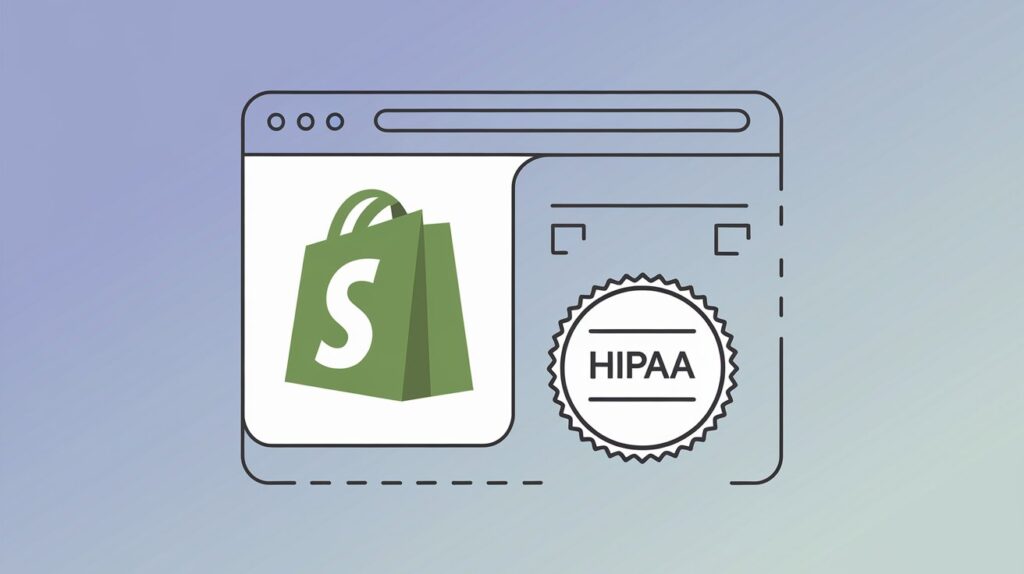What is HIPAA and Why Does it Matter?
The Health Insurance Portability and Accountability Act (HIPAA) is a U.S. law enacted in 1996 to protect sensitive patient information. It requires businesses that handle health data, known as Protected Health Information (PHI), to maintain strict confidentiality and security standards.
HIPAA compliance ensures that entities, like healthcare providers and any organization handling PHI, safeguard personal medical information. Non-compliance can result in significant legal penalties, including fines up to $1.5 million per year, per violation, as well as reputational damage.
For eCommerce businesses looking to handle PHI, understanding HIPAA is critical. When it comes to platforms like Shopify, which is popular for online stores, it’s important to know whether it meets HIPAA standards.
Does Shopify Offer HIPAA Compliance?
As of now, Shopify does not offer HIPAA compliance out of the box. This means that the platform is not equipped to meet the stringent security and privacy requirements for handling Protected Health Information (PHI) as outlined by HIPAA.
While Shopify provides robust features for eCommerce businesses, it has not tailored its platform specifically for healthcare or any business that deals with sensitive health data. Shopify does not sign Business Associate Agreements (BAAs), which is a mandatory requirement for platforms handling PHI. Without a BAA, Shopify cannot be deemed HIPAA compliant, putting businesses handling PHI at risk of non-compliance.
If you’re in a HIPAA-regulated industry, you’ll need to look for other solutions or customizations to ensure your store complies with HIPAA requirements, or consider alternative platforms that specialize in healthcare.
Key Considerations for HIPAA Compliance on Shopify
Although Shopify does not natively offer HIPAA compliance, some businesses may still want to use the platform while attempting to meet HIPAA standards. If you’re considering using Shopify for a HIPAA-regulated business, there are several important factors to keep in mind:
- Data Encryption: HIPAA requires that any PHI transmitted or stored online must be encrypted both at rest and in transit. Shopify does offer SSL encryption for data in transit, but additional measures might be needed to secure PHI when stored.
- Access Controls: Ensuring that only authorized personnel have access to PHI is a core HIPAA requirement. While Shopify allows some level of user access control, it may not be enough to meet HIPAA’s specific requirements for tracking and managing access to sensitive data.
- Audit Controls: HIPAA requires a comprehensive audit trail for any interactions with PHI. Shopify does not provide an in-depth audit log designed to meet HIPAA standards, meaning you’ll need to rely on third-party integrations or custom solutions.
- Backup and Recovery: HIPAA also mandates that businesses have a reliable system for backing up and recovering PHI in case of data loss. While Shopify offers data backup features, they are not built with HIPAA in mind.
- Business Associate Agreement (BAA): As mentioned earlier, Shopify does not sign BAAs, which is a legal agreement necessary for any service provider handling PHI. Without this, it’s impossible to be fully HIPAA compliant on Shopify.
Given these considerations, using Shopify to handle PHI is highly risky unless significant additional security measures and custom solutions are implemented.
How to Ensure Your Shopify Store Meets HIPAA Requirements

While Shopify itself isn’t HIPAA-compliant, there are steps you can take to minimize risk and improve the security of your Shopify store. However, it’s important to note that these measures may not guarantee full HIPAA compliance. Here’s what you can do:
- Third-Party Solutions: Consider integrating third-party applications that specialize in HIPAA compliance. These solutions can provide enhanced security features, such as PHI encryption, detailed access controls, and audit logs that meet HIPAA standards. You may also find third-party hosting services that sign a Business Associate Agreement (BAA).
- Custom Development: To fully control data security, you might need to invest in custom development. This involves working with developers to implement HIPAA-compliant encryption methods, audit trails, and secure data storage within your Shopify store. It may also be necessary to create separate secure portals for managing sensitive health information.
- Limit PHI Collection: One way to reduce risk is to avoid collecting PHI altogether. If your business can operate without handling sensitive health data directly, you can still leverage Shopify’s eCommerce capabilities without worrying about HIPAA compliance. For example, limit your data collection to non-health-related personal information.
- Consult with Legal Experts: It’s crucial to consult with legal professionals who specialize in HIPAA regulations. They can advise you on how to structure your business operations and Shopify store to minimize liability and ensure you’re following the law as closely as possible.
- Regular Security Audits: Conduct regular security audits to identify vulnerabilities in your Shopify store. Work with cybersecurity experts to address any weaknesses that could compromise your data security and HIPAA compliance efforts.
Although these steps can enhance the security of your Shopify store, it’s important to recognize that Shopify, without signing a BAA, is not fully compliant with HIPAA. Therefore, the best course of action for businesses dealing with PHI may be to explore alternatives that are built for healthcare.
Potential Risks of Using Shopify for HIPAA-Regulated Businesses
If you operate in a HIPAA-regulated industry and are considering using Shopify, it’s essential to understand the potential risks. Non-compliance with HIPAA can result in severe consequences, both legally and financially. Here are some risks you may face:
- Legal Penalties: Failing to meet HIPAA requirements could lead to hefty fines, ranging from $100 to $50,000 per violation, depending on the level of negligence. These fines can add up quickly, potentially costing a business millions if sensitive health data is compromised.
- Data Breaches: Shopify, while secure for typical eCommerce transactions, does not offer the level of data protection needed for PHI. If PHI is breached due to inadequate security measures, your business could face lawsuits, loss of trust, and irreparable damage to your reputation.
- Lack of BAA: Without a Business Associate Agreement (BAA), Shopify leaves your business exposed. In the event of a data breach, you will be solely responsible for any non-compliance penalties. Shopify is not legally obligated to help mitigate the impact of a breach involving PHI.
- Incomplete Security Features: Although Shopify provides encryption for transactions, its platform lacks many of the detailed controls and audit logs required by HIPAA. This means sensitive information could be vulnerable to unauthorized access, making it difficult to prove compliance in the event of an audit.
- Reputational Damage: A data breach or HIPAA violation can severely impact your brand’s reputation. Customers who rely on you to keep their sensitive health information secure may lose trust in your business, affecting your bottom line and long-term growth prospects.
Given these risks, it’s important to carefully evaluate whether Shopify is the right platform for your business, especially if you handle sensitive health-related information.
Alternatives to Shopify for HIPAA-Compliant Stores

For businesses that need to handle Protected Health Information (PHI) and meet HIPAA requirements, there are several eCommerce platforms specifically designed with compliance in mind. These alternatives provide the necessary security features and legal agreements to ensure your business stays within the law.
- BigCommerce (with HIPAA-Compliant Hosting): While BigCommerce itself is not HIPAA-compliant, it can be paired with third-party HIPAA-compliant hosting services like TrueVault or Paubox. These services ensure the secure storage and transfer of PHI, along with audit trails and encryption that meet HIPAA standards. By using BigCommerce with HIPAA-compliant hosting, you can build a secure and scalable eCommerce store.
- Square: For businesses needing a point-of-sale solution in addition to eCommerce, Square offers HIPAA-compliant payment processing when used with Square for Healthcare. While not a full-fledged eCommerce platform, Square provides a range of healthcare-specific features, including secure payment processing and appointment management, making it a viable option for smaller healthcare businesses.
- WooCommerce with HIPAA-Compliant Hosting: WooCommerce, a popular WordPress plugin, can also be made HIPAA-compliant by integrating with HIPAA-certified hosting providers like Atlantic.Net or Liquid Web. These hosts provide the necessary data encryption, access controls, and audit logs to ensure that PHI is protected. Since WooCommerce is highly customizable, it’s an excellent option for businesses that want full control over their online store while maintaining HIPAA compliance.
- NexHealth: Designed specifically for healthcare practices, NexHealth is a HIPAA-compliant patient management platform that includes eCommerce features. NexHealth allows medical practices to sell products and services directly to patients while ensuring PHI is handled in accordance with HIPAA regulations.
- Magento (with HIPAA-Compliant Hosting): Magento is a powerful eCommerce platform used by many large enterprises. When combined with a HIPAA-compliant hosting provider, it can handle the unique security needs of businesses dealing with health data. Magento’s flexibility allows you to build a custom, HIPAA-compliant eCommerce experience tailored to your specific requirements.
These alternatives provide the necessary security and legal assurances for handling PHI, unlike Shopify, which lacks native HIPAA support. Depending on your business needs, any of these platforms could offer a safer and more compliant solution for your healthcare-related eCommerce store.
Conclusion: Is Shopify the Right Choice for HIPAA Compliance?
In summary, while Shopify is a powerful and user-friendly eCommerce platform, it is not HIPAA compliant. It lacks the necessary features and legal safeguards, such as signing a Business Associate Agreement (BAA), that are required to handle Protected Health Information (PHI) securely.
For businesses in healthcare or industries handling sensitive health data, using Shopify could expose you to significant legal and financial risks. While it is possible to implement custom solutions and third-party services to enhance security, these measures still might not fully meet HIPAA requirements, particularly because Shopify does not offer native HIPAA compliance features or agreements.
If HIPAA compliance is critical to your business, it’s best to explore alternatives that are built with healthcare needs in mind. Platforms like BigCommerce (with HIPAA-compliant hosting), WooCommerce (with HIPAA-compliant hosting), or healthcare-specific solutions like NexHealth offer better paths for ensuring compliance while providing robust eCommerce features.
Ultimately, if your business doesn’t handle PHI, Shopify remains an excellent option for building a secure and scalable online store. However, for healthcare businesses that need to strictly adhere to HIPAA, Shopify is not the ideal platform.
